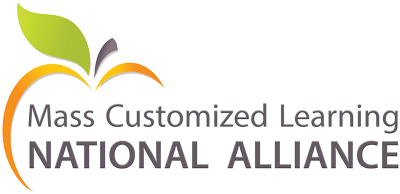-
Shifting the Mindset
Motivation, engagement, and empowerment all are all part of the learner-centered MCL mission and vision.
Building an understanding of a future-focused, uncompromisingly learner-centered MCL mission and vision, aligning all resources to support implementation and allowing the MCL vision to drive all decisions, are critical factors in this component. Empowering learners, learning facilitators, and leaders, informed by a clearly define vision for MCL and the research on motivation and engagement, will create an enabling culture for shifting the mindset and transforming to a Mass Customized Learning Community. -
Skilled Leadership
Visionary, committed, collaborative leadership is essential to the learner-centered approach at the core of MCL.
Such leaders value insights gleaned from research and instructional practice. They engage and empower others thoughtfully and deliberately with the design and implementation of a plan focused on meaningful capacity building and continuous improvement. Their leadership results in a transformed system driven by learner-centered data and decisions. A valued resource for skilled leadership is Schwahn and McGarvey’s book titled Inevitable Too!: The Total Leader Embraces Mass Customized Learning. -
Quality Instruction
Meeting the needs of individual learners requires high quality instruction which is embedded in the Ideal Learning Experience and central to the MCL vision.
Learning Facilitators of MCL embrace a shared model and taxonomy which demonstrates a sound understanding of learning. Working individually and collaboratively, they design, implement, reflect on, and adjust their instructional strategies for meeting the needs of individual learners. Also, Learning Facilitators invest in their own capacity by learning more about their craft, networking with others, and incorporating technology as an integral tool for the instructional process. -
Viable Learning Outcomes
Learning expectations are driven by, shaped, and gauged by what learners need to know, what they should be able to do, and they are to be like.
Organized in progressions of learning, the Learning Outcomes provide focus for instruction and incorporate a variety of learning formats (e.g. seminars, labs, online, etc.) with explicit consideration of how an outcome is best learned. The Learning Outcomes serve as the basis for meaningful communication about learning with and among learners, parents, and the entire Learning Community. -
Motivating Learning Opportunities
Opportunities for learners which center around their needs, value their uniqueness, and engage them meaningfully motivates learners effectively.
Within a culture which emphasizes a growth mindset, practices voice and choice, and offers a diversity of learning formats, learners are more likely to succeed with achieving challenging Learning Outcomes. Working at their own pace, addressing content of interest to them, engaging in their optimum style of learning, and receiving meaningful feedback are all contributing factors to motivating learners productively and significantly. -
Varied Evidence of Learning
Meaningful evidence of learning informs the learning process, empowers the learner, and results in products of learning aligned with Learning Outcomes.
A diversity of data gleaned from the learning experiences provides a sound basis for adjusting instructional opportunities. Also, the data offer constructive feedback for learners about their progress. Inherent in the “evidence process” is building the capacity of the learner to take an active role with setting goals, engaging appropriately, monitoring progress, and making adjustments as needed—within a culture which values inquiry and growth mindset. -
Transformational Technologies
Realizing the vision of MCL requires powerful, emerging technology infrastructure and applications to transform and support a new educational model.
Equipped with “1 to 1” devices, stakeholders are positioned to access and engage with a world of information, produce evidence of learning, and manage the learning process effectively. The technology system provides the management of student information, the management of learning outcomes and opportunities, and the management of complex schedules. The system supports 24/7 access for all stakeholders, offers flexible and friendly interactions and appropriate levels of control for all users, and generates data/reports for informed decision-making. -
Customized Structures
Implementing new structures which facilitate and support a learner-centered approach is imperative for attaining the vision of MCL.
Learners have Customized Learning Plans specifying Learning Outcomes clustered into modules. Learning Coaches and Learning Facilitators work as teammates to support learners with the implementation of their plans and to provide guidance during the learning process.Learning opportunities incorporate a diversity of individual and group experiences, vary in length from a few weeks to an ongoing experience, are facilitated via flexible and responsive scheduling, and reflect the reality of learning anytime and anywhere. Feedback is the focus of assessment based on rubrics; and the evidence of learning is the gateway to credentialing.

